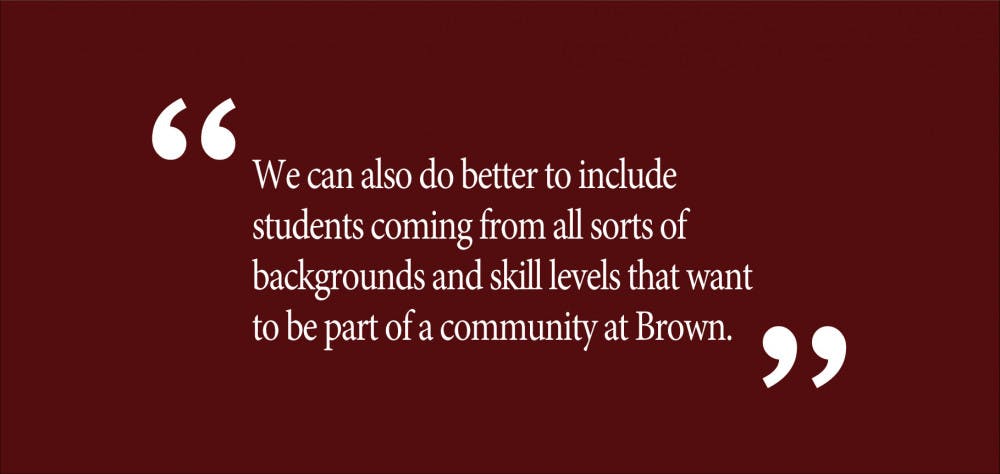For people who have had plenty of success in high school, from college applications to scholarships, rejection from a student group can be a shock — especially in their first semesters at Brown. It might be surprising to learn that not all student groups at Brown are open to everyone.
Many clubs require an application process before becoming a member, after which some, but not all, make the cut. This is for a variety of reasons, including space and experience level. Exclusivity in clubs at Brown is, in some cases, logistically unavoidable. Still, more effort should be funneled into including every person who is passionate about a student group. We should be mindful of why one person may be more qualified than another.
Some student-run organizations understandably need a vetting process based on the group’s objectives and missions. Clubs that interact directly with the Providence community or work with people of other identities and backgrounds need members who are culturally sensitive and care about more than stacking their resumes. In this instance, a screening process for applicants is a good use of selectivity in student organizations. Even so, awareness of power and privilege can be learned, and students can reapply and still later join the group once they have acquired this awareness through educating themselves.
Other types of student groups simply need caps, such as volunteer-based groups with a limited number of shifts that cannot accommodate as many members as there are applicants. This limit may be further compounded when these clubs are related to the most popular concentrations at Brown, including Economics, Computer Science and Public Health. As students apply in droves to bolster their resumes and gain experience in their fields, there will always be more qualified applicants than there are positions.
This competitive process is inevitable, but it provides a professional advantage for students that manage to get involved with a club earlier in the year, while rejected applicants may have to wait for the next recruiting season. A potential solution to this could be to accept all qualified applicants and have them serve in terms: half could have active roles in the fall semester and the other half could participate in the spring. The alternative of rejecting motivated students may discourage them from reapplying the following semester or year.
This does not have to be the only solution.
There are groups that need specific prospective members to apply because what they do requires some previous experience or demonstrated passion, like the Brown Debating Union or the University’s many a capella groups. An application or audition process makes sense, as these organizations are nationally competitive and need some of the best among Brown’s student body to advance their rankings and prestige. However, we must recognize that having experience in some of these activities can be based on privilege and access to resources in high school. Some Brown students may not have had the chance to hone these skills previously. Even with the strongest enthusiasm, an applicant may not be considered based on lack of experience alone. Some consideration should be given to eagerness to learn.
On the other hand, it is true that for many students at Brown who had great success in their high school careers and earlier endeavors, not getting into clubs can be a rewarding experience. It can prepare people for the inevitable rejection that comes with applying to summer opportunities, jobs, post-baccalaureate education and beyond. Rejection from internships and job opportunities, and even student-run organizations on campus, should be normalized in a competitive environment like Brown where imposter syndrome can make simple “no’s” feel like the end of the world. But we can also do better to include students coming from all sorts of backgrounds and skill levels that want to be part of a community at Brown. There should be a comprehensive list of fulfilling groups on campus that are looking to take students from all years and degrees of experience. An organized list of the most accessible University groups would be a fantastic first point of reference for all students seeking an inclusive space, especially for first-year students. Groups that take people with no experience are doing great work in turning the culture of exclusivity into one of inclusivity. Still, there is more work to be done in making sure everyone has a place at Brown and feels like a part of a community on campus.
Rachael Schmidt ’21 can be reached at rachael_schmidt@brown.edu. Please send responses to this opinion to letters@browndailyherald.com and op-eds to opinions@browndailyherald.com.





